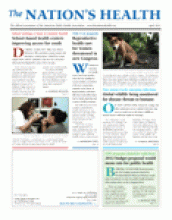Bicycle injuries reduced when riders stick to paths
Bicycle riders have fewer injuries when they ride on cycle tracks — physically separated bike-exclusive paths along roads — than on the road.
A study in the Feb. 9 issue of Injury Prevention compared injury rates of cyclists on bicycle tracks in Montreal with bike injuries on streets in that city. Such tracks are popular in Montreal and the Netherlands.
The study found a 28 percent lower risk on cycle tracks, even though such tracks carried 2.5 times more bicyclists than the roads.
“Bicycling is the best activity for health because it is routine and of high intensity, but we need safer and more comfortable bicycle routes,” said study lead author Anne Lusk, PhD, research association in the Department of Nutrition at the Harvard School of Public Health.
“Bicycling could address obesity, cancer, stroke, diabetes, asthma, mortality and pollution,” the study’s authors wrote. “However, the bicycling environment is a limiting factor.” In the Netherlands and Denmark, for example, where bicycle tracks are common, 27 percent of trips are by bicycle and the injury rate is low.
In the United States, only 0.5 percent of commuters cycle to work, and the injury rate of bicyclists is at least 26 times greater than in the Netherlands.
States exchanging electronic health information
Public health agencies and health providers in Minnesota and Rhode Island have begun exchanging electronic health information under a new federal pilot program.
“This is an important milestone in our journey to achieve secure health information exchange, and it means that health care providers large and small will have an early option for electronic exchange of information supporting their most basic and frequently needed uses,” said David Blumenthal, MD, MPP, national coordinator for health information technology. “Other efforts are also going forward at full throttle to build a comprehensive structure of health information exchange.”
Since mid-January, Minneapolis’ Hennepin County Medical Center has been successfully sending immunization records to the Minnesota Department of Health. The Rhode Island Quality Institute is working to improve care when patients are referred to specialists by demonstrating provider-to-provider data exchange.
Similar exchanges will launch soon in New York, Connecticut, Tennessee, Texas, Oklahoma and California, HHS officials said in February. For more information, visit http://directproject.org.
Needle exchange programs eligible for federal grants
U.S. Surgeon General Regina Benjamin, MD, MBA, has determined needle exchange programs are effective in reducing intravenous drug use, making such programs eligible for federal Substance Abuse Prevention and Treatment Block Grant funds.
A notice was published in the Feb. 23 Federal Register that outlined Benjamin’s findings as reflecting “the scientific evidence supporting the important public health benefit” of needle exchange programs and that the findings meet the requirement to qualify for block grant funding. In 2009, Congress and President Obama lifted the 21-year ban on federal funding for needle exchange programs but did not earmark money for the programs.
Based on Benjamin’s determination that needle exchanges are effective in reducing drug abuse and HIV transmission, the U.S. Department of Health and Human Services now plans to issue guidelines on running such programs. Studies have shown needle exchange programs reduce HIV transmission, promote people to enter treatment and reduce drug use.
The announcement came too late for at least one successful program. In February, PreventionWorks!, a need exchange program based in Washington, D.C., was forced to close because of a lack of funding.
- Copyright The Nation’s Health, American Public Health Association









